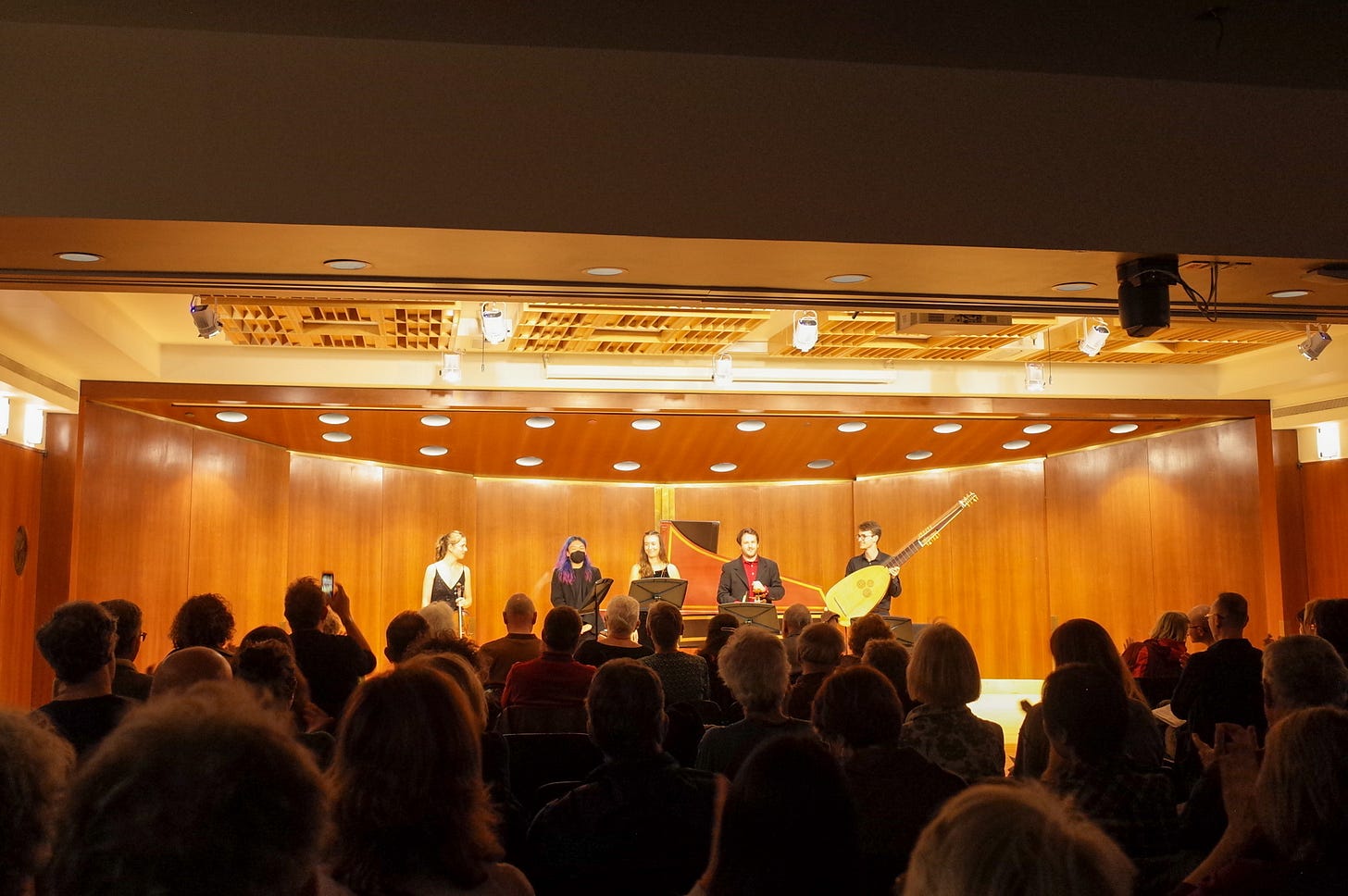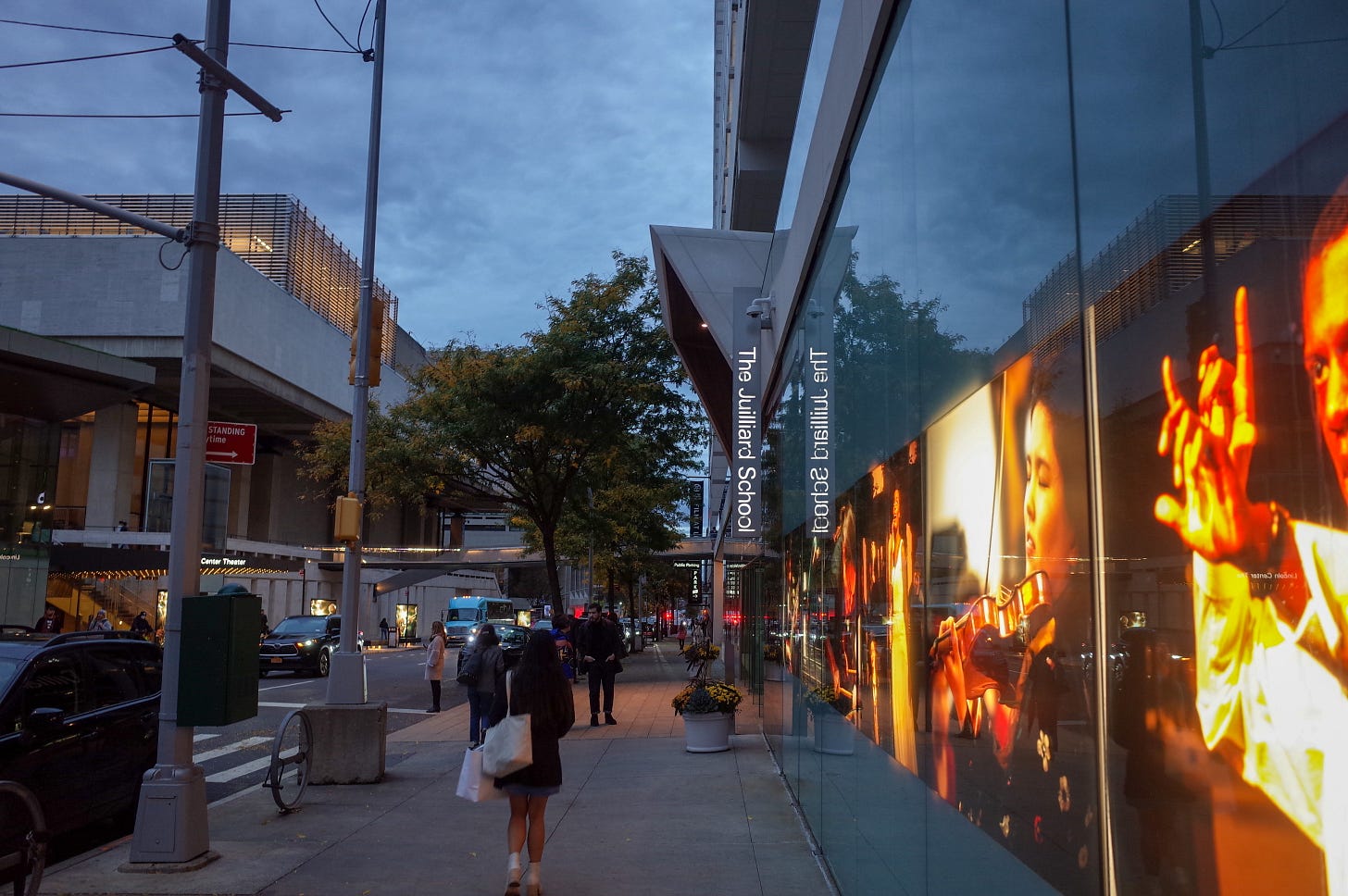I took a trip down memory lane this week to visit The Juilliard School—the conservatory at which I studied for my Master of Music degree. At a free 6 PM performance in the street-level theater known as Morse Hall, students of Juilliard’s tuition-free Historical Performance department performed a program of chamber music of the French Baroque.
The Historical Performance department specializes in teaching the music and performance practices of the Baroque era, and, with the exception of one doctoral student, all of the students are pursuing a masters degree or a graduate diploma (which apparently means that they just have to take a few less credits than the masters students). I was a student in the early days of the program, and during my time there, I had the opportunity to meet and to learn from people who were responsible for establishing and developing approaches to music making in the field of early music.
Musicians such as William Christie, a champion of the French Baroque and the founder of Les Arts Florissants, and Jordi Savall, made famous by his involvement in the 1991 Alain Corneau film Tous les matins du monde, visited the program while I was there. I went on more than one international tour with the eminent Johann Sebastian Bach interpreter, Masaaki Suzuki. We even had exposure to some great creative people outside of our field such as the dancer and choreographer Mark Morris, who warmed up the school’s Baroque orchestra with physical exercises that got our heart rates up, sharpened our attention, and strengthened our sense of collective endeavor.
While I was attending Juilliard, many people in the program had already received a first masters degree, and there were even two people in the program who already had their doctorates. Some of my classmates wanted to immerse themselves in a musical language that they had encountered more briefly in their previous studies. Others were delaying their entry into a field with few full or most-time performance jobs at any income level.
Today, many of the students in the Historical Performance department are pursuing their first and likely only masters degree, and the half of the class who started the program this year has only been immersed in playing Baroque-style instruments for around two months. Public performances at this point in their training are very much a trial by fire, but the program is filled with talented musicians who rose to the occasion.
The program featured the music of two composers: Jean-Marie LeClair (1697–1764) and François Couperin (1668–1733). Though those composers don’t have the reach in our contemporary cultural perception as other Baroque composers such as J.S. Bach or George Frideric Handel, their music is somewhat ubiquitous among people who play or listen to French Baroque chamber music.
The violinist LeClair was a craftsman who made some of his income making lace, a principal dancer with the Turin Opera, and a court musician of Louis XV. His death is still a could case—he was stabbed to death at his home, and the killer was never found.
The harpsichordist and organist Couperin spent his life as a church musician and was also a court musician of Louis XIV. Though he composed motets and other church music, he is now most well known for his published chamber music.
The students who performed the music of LeClair and Couperin had a two part assignment: they needed to write program notes for the concert that were published in the program, and they needed to rehearse and perform the assigned music.
The program notes represented a range in tone, writing ability, and focus. Some of the notes focused more on biographical details while others described the music itself. I was most excited to see the violinist Annemarie Schubert discuss composers reusing and recycling their prior compositions and describing composing during the time of LeClair as a craft. Craftsmanship is a concept that I hope will return to the forefront of our contemporary understanding of music making.
The music making itself had a few notable moments. Leonard Fenton (flute), Lara Mladjen (violin), Kosuke Uchikawa (cello), and Nathan Mondry (harpsichord) performed some excerpts from Couperin’s Le Françoise, which is part of a larger piece from 1726 called Les Nations. The way their energy coalesced at the beginning of their part of the program was simply captivating. Each of the musicians acknowledged each other and breathed as one. Their active listening provided a solid foundation for their subsequent music making.
I was also very impressed with Kosuke’s tasteful and swift tuning of his cello and the melodic and whimsical notes from Nathan that helped Leonard tune his flute while simultaneously entertaining the audience. Anyone who has gone to a contemporary performance of Baroque music has likely encountered the prolonged horror of repetitive, distasteful, and monotonous tuning. People who frequently attend these performances can get desensitized over time to that part of the experience, but it is an objectively off-putting component of many musical performances.

Four different groups of students performed four sets of music during the chamber music concert. The group that I believe felt most like a cohesive and convincing unit was the final group who performed Le Parnasse, ou L’Apotheose de Corelli by Couperin. Ultimately, there is a big difference between capable people who happen to play music with other people at the same time and musicians whose shared venture is greater than the sum of their individual efforts.
Annemarie Schubert (violin), Ela Kodžas (violin), Allen Maracle (cello), Yunyi Ji (haprsichord), and Dani Zanuttini-Frank (theorbo) pulled off this feat early in the year at Juilliard, and I much appreciated it. I want to mention in particular that Dani was wonderfully expressive with his movements and was helpfully communicative with the other musicians, and I believe that his behavior and musically sensitive emoting went a long way to enabling that group’s successful performance.
However, I feel compelled to mention some aspects of the concert experience that I think were less than desirable. Group after group would come onto stage without smiling or connecting with the audience in any meaningful way. Between movements, there was often antisocial body language on display that didn’t correspond with the music and created a sense of awkward waiting in the audience. And when certain musicians on stage were not playing while other musicians were, the musicians who were not playing didn’t physically respond to the music or acknowledge the other musicians on stage.
There’s something deeply artificial and off-putting about this type of behavior. It’s barely noticed in a classical or early music environment, but from anyone encountering a concert like this for the first time, behavior of this type is strange and unsettling. The type of social oversight required for this to feel normal is hard to habitually find outside of an academic environment. Admittedly, it’s difficult for people engaged in a niche part of culture to notice when an aspect of what they do is antisocial, but soliciting feedback from people who are not a core part of one’s audience can help to rectify these types of oversights.
It has been quite a while since I attended a concert of this type that I did not play, and the large attendance gap enabled me to have a more dispassionate view of the experience. With the time off, it was easier to enjoy the more touching musical moments and relative oddity of experiencing eighteenth-century French music during a work week, and it was harder to get used to socially uncomfortable aspects of the concert experience that I didn’t much enjoy.
My experience returning to Juilliard this week helped me to renew my sense of priorities for creating experiences in a concert environment, and it challenged me to discover what I take for granted by seeking feedback outside of my core audiences. Sometimes, all it takes to improve the experience of an audience is to spend time in their shoes and intentionally weave what happens on stage into that social tapestry.
Last Week (Wed, Oct 25, 2023 to Tues, Oct 31, 2023)
Last weekend, I played a program in Connecticut and Western Massachusetts called Fantastic Baroque! with an ensemble called Crescendo. On Monday evening, I saw the Historical Performance Chamber Music program at The Juilliard School and caught up with some of my former teachers. Halloween traffic on my street was rather sparse, and only one group of kids visited us. Consequently, I will likely have too much sugar from the leftover candy for the rest of the month.
This Week (Wed, Nov 1, 2023 to Tues, Nov 7, 2023)
This week, I will attend a performance by Mark DeGarmo Dance called Las Fridas: An Offering for the Days of the Dead. November 1st is All Saints Day, and I’ll make a trip to church to celebrate. November 7th is Election Day, and I’ll go vote for my local officials. The rest of the week will be filled with board meetings and preparations for future performances (stay tuned!).





Love it, Jeremy! Sorry haven't had a chance to formulate any substantial responses but wanted to let you know I'm reading and following along avidly (:
Also, ambitious request here but a couple NYC "scenes" you should try to somehow get access to, would love to read pieces on (I think both might address your issue with the antisocial component of classical aka museum music lol jk):
https://www.youtube.com/watch?v=9h451Btc6eU (they do play clubs but if you somehow get into Emmett's Harlem apartment you will tell me and I will fly in)
https://www.youtube.com/watch?v=OKPC-T3jjRg (ok less a scene and more an isolated miracle but still they surely do public performances??)
Thank you, Jeremy, for your essays.
On a personal note, I have abundant opportunity to attend concerts now that I'm retired and raise similar questions as I appreciate and analyze the performances I have chosen to attend.
Louise Basbas